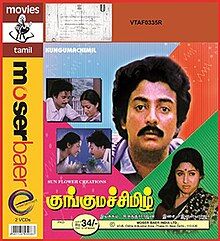Kunguma Chimil
| Kunguma Chimil | |
|---|---|
 VCD cover | |
| Directed by | R. Sundarrajan |
| Written by | R. Sundarrajan |
| Produced by | Durai Rasappan Srinivasan |
| Starring | Mohan Ilavarasi Revathi Chandrasekhar |
| Cinematography | Rajarajan |
| Edited by | B Krishnakumar Srinivas |
| Music by | Ilaiyaraaja |
Production company | Sunflower Creations |
Release date |
|
| Country | India |
| Language | Tamil |
Kunguma Chimil (transl. Saffron Kit) is a 1985 Indian Tamil-language film written and directed by R. Sundarrajan. The film stars Mohan, Ilavarasi, Revathi and Chandrasekhar. It was released on 23 August 1985.[1][2]
Plot
[edit]Ravi (Mohan) and Philomena (Ilavarasi), two orphans from different backgrounds, meet on a bus journey to Chennai. Ravi, despite holding a diploma, struggles to find employment in the city and becomes a rickshaw driver, while Philomena, a Catholic nurse, flees from her foster father after discovering his involvement in fraudulent activities.
The two form a bond, but their lives take a difficult turn as they face homelessness, poverty, and a series of personal challenges. Philomena, feeling like a burden, leaves Ravi temporarily to give him a chance to improve his situation. Meanwhile, Ravi stumbles upon a large sum of money and uses it to secure a job as a forest supervisor, unaware that the money belongs to Rukumani's (Revathi) father, Manikkum (Delhi Ganesh), who lost it during a bus ride.
Rukumani, who works for Ravi as a maid, develops feelings for him, but she is also pursued by Sekhar (Chandrasekhar), a wealthy man who gives up everything to be with her. As tensions rise, Ravi discovers the truth about the money and feels guilty for inadvertently causing Rukumani and her father's misfortunes. He contemplates marrying Rukumani to make amends, but his heart remains on Philomena.
Rukumani chooses to marry Sekhar, and Ravi is reunited with Philomena, leading to a happy conclusion for both couples.
Cast
[edit]- Mohan as Ravi
- Ilavarasi as Philomena "Philo"
- Revathi as Rukumani "Ruku
- Chandrasekhar as Sekhar
- Delhi Ganesh as Manikkum, Ruku's father
- V. Gopalakrishnan as David
- Senthil
- Loose Mohan as Ganesan
- Typist Gopu as Manager
- Pasi Narayanan as Narayanan
- Sivaraman
- Bayilvan Ranganathan
Production
[edit]Santhosh Tea shop at Adyar, Chennai was featured in the film for a single shot.[3]
Soundtrack
[edit]The film's soundtrack was composed by Ilaiyaraaja.[4][5] The song "Nilavu Thoongum" is set in the Carnatic raga Mohanam,[6][7] "Goodsu Vandiyile" is set to Keeravani,[8] and "Poongatre Thendathey" is set to Brindavani Sarang, a Hindustani raga.[9][10]
| Song | Singers | Lyrics | Length |
|---|---|---|---|
| "Poongatre Thendathey" | S. Janaki | Gangai Amaran | 04:33 |
| "Nilavu Thoongum Neram" | S. P. Balasubrahmanyam, S. Janaki | Vaali | 02:08 |
| "Nilavu Thoongum Neram" | S. Janaki | Vaali | 04:34 |
| "Goodsu Vandiyile" | Malaysia Vasudevan, S. Janaki | Vaali | 04:23 |
| "Kai Valikkuthu Kai Valikkuthu" | Malaysia Vasudevan, S. Janaki | Vaali | 04:29 |
| "Vaichalam Nethi Thankaiyalaey" | Malaysia Vasudevan, Vani Jairam | Vaali | 04:22 |
Reception
[edit]Jayamanmadhan of Kalki praised the film for its soundtrack and cinematography.[11]
References
[edit]- ^ ராம்ஜி, வி. (23 August 2019). "'குங்குமச்சிமிழ்' - 34 வயது!". Hindu Tamil Thisai (in Tamil). Archived from the original on 8 November 2021. Retrieved 8 November 2021.
- ^ அனுஷா, சு. (23 August 2017). "'நிலவு தூங்கும் நேரம்... நினைவு தூங்கிடாது!' - #32YearsOfKungumaChimil". Ananda Vikatan (in Tamil). Archived from the original on 8 November 2021. Retrieved 8 November 2021.
- ^ Iyer, Lalita (21 August 2017). "Chicago tea with a spoonful of Communism". The Week. Archived from the original on 15 October 2024. Retrieved 15 October 2024.
- ^ "Kunguma Chimil Tamil Film LP Vinyl Record by Ilayaraja". Mossymart. Archived from the original on 8 November 2021. Retrieved 8 November 2021.
- ^ "Kunguma Chimizh (Original Motion Picture Soundtrack) – EP". Apple Music. 1 January 1985. Archived from the original on 14 April 2023. Retrieved 14 April 2023.
- ^ Sundararaman 2007, p. 149.
- ^ Saravanan, T. (20 September 2013). "Ragas hit a high". The Hindu. Archived from the original on 26 December 2018. Retrieved 1 November 2020.
- ^ Sundararaman 2007, p. 131.
- ^ Sundararaman 2007, p. 154.
- ^ ராமானுஜன், டாக்டர் ஜி. (5 July 2018). "ராகயாத்திரை 12: மனத்தில் பூத்த ராக மலர்". Hindu Tamil Thisai (in Tamil). Archived from the original on 15 October 2024. Retrieved 15 October 2024.
- ^ ஜெயமன்மதன் (8 September 1985). "குங்குமச்சிமிழ்". Kalki (in Tamil). p. 61. Archived from the original on 29 July 2022. Retrieved 8 November 2021.
Bibliography
[edit]- Sundararaman (2007) [2005]. Raga Chintamani: A Guide to Carnatic Ragas Through Tamil Film Music (2nd ed.). Pichhamal Chintamani. OCLC 295034757.
